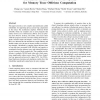Free Online Productivity Tools
i2Speak
i2Symbol
i2OCR
iTex2Img
iWeb2Print
iWeb2Shot
i2Type
iPdf2Split
iPdf2Merge
i2Bopomofo
i2Arabic
i2Style
i2Image
i2PDF
iLatex2Rtf
Sci2ools
ASPLOS
2015
ACM
2015
ACM
GhostRider: A Hardware-Software System for Memory Trace Oblivious Computation
This paper presents a new compiler and architecture called GhostRider for supporting privacy preserving computation in the cloud. The architecture employs Oblivious RAM (ORAM) which our compiler uses to emit programs that satisfy memory-trace obliviousness (MTO): Even an adversary that observes memory, bus traffic, and access times while the program executes can learn nothing about the program’s sensitive inputs and outputs. A na¨ıve way to achieve MTO is to allocate all code and data in a single ORAM, and disable caches or fix the rate of memory traffic to avoid timing channels. GhostRider’s compiler instead allocates data to non-oblivious, encrypted RAM (ERAM) and employs a scratchpad when the memory trace, and timing differences, are not a source of leaks, respectively. The compiler can also allocate to multiple ORAM banks when safe, which sometimes significantly reduces access times. We have formalized our approach and proved it enjoys MTO. Our FPGAbased hardware prototy...
| Added | 16 Apr 2016 |
| Updated | 16 Apr 2016 |
| Type | Journal |
| Year | 2015 |
| Where | ASPLOS |
| Authors | Chang Liu, Austin Harris, Martin Maas, Michael W. Hicks, Mohit Tiwari, Elaine Shi |
Comments (0)

